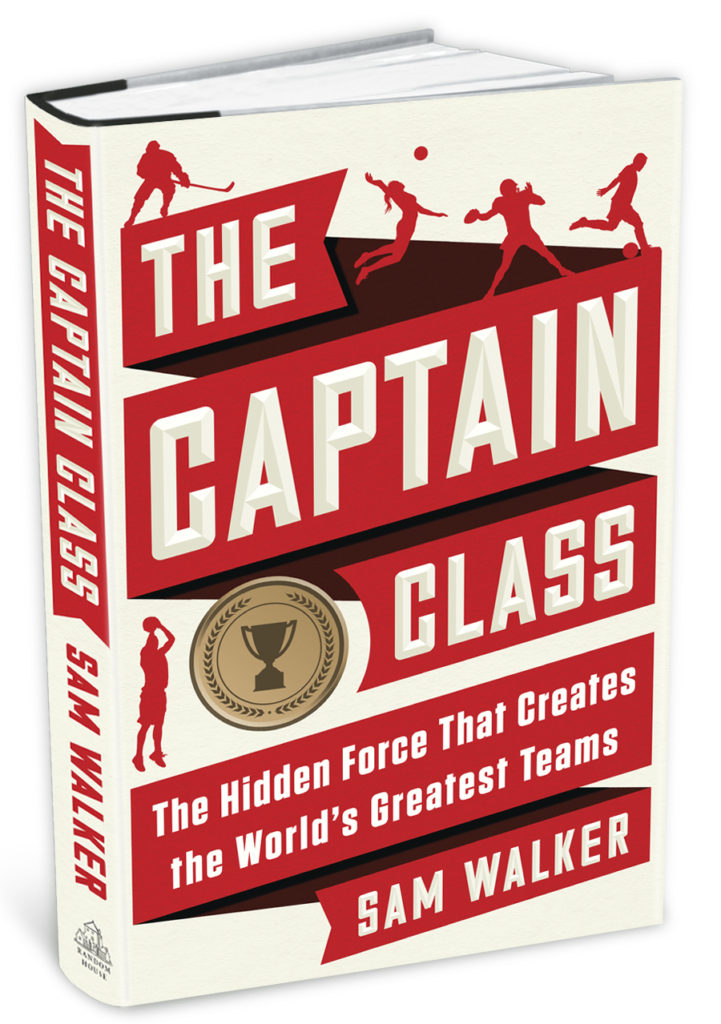
Written by Wall Street Journal writer, Sam Walker, The Captain Class is a look at how the captain of a given great side can have the influence on a team's performance perhaps greater than the more heralded coach or manager.
Using a mixture of in-depth research, statistical analysis and psychological studies, Walker has looked at team sport across the spectrum and attempted to nail a theory that perhaps the Captain is the focal point of these Tier One (elite) sides that separates them from the Tier Two sides that fail to break through; this difference leads to dynasties and dominance instead of one-season wonders.
In the first part of the book, Walker breaks down what makes a great team; was this team in the sport far and away the best side, did they beat equally great sides, was this dominance sustained over a period of time sometimes with managerial/coaching changes occurring. This analysis includes win percentage and record against equally high percentage win sides in playoffs and championship matches.
Walker is good in bringing light to some unheralded sports, the most distant team he selects is the Collingwood Magpies who ruled Australian Rules Football between 1927-1930. Other teams selected are from Cuba's women's volleyball team (1991-2000), the women Hockeyroos of Australia (1993-2000) and the French men's handball team (2008-15) whose captain Jerome Fernandez led the team to a European Championship win knowing his father was on his deathbed.
In an early chapter, Walker makes the point that the teams he notes are not led by a supreme talent as their captain but within that side may be contain an elite or illustrious talent yet having an elite talent does not mark it out as a Tier One team, hence why Michael Jordan's Chicago Bulls side is absent.
However, within these great teams selected by Walker are the Brazil soccer side which had Pele, the Barcelona football side of this millennium which contains Lionel Messi and Dan Carter in the New Zealand All Blacks of 2011-15.
Yet by the end Walker brilliantly deconstructs the legend of Jordan as a leader and why he does not make the cut. Walker's ideal leader is one who shies away from the limelight off the court, would rather fold laundry and get 12 hours sleep a night; they lead by example, bending not breaking the rules to gain a distinct advantage in flashpoints, using both verbal and non-verbal communication to instil motivation into their teammates.
This is indicative in the chapter concerning Tim Duncan of the San Antonio Spurs, an NBA side that has made the playoffs for the 19 nineteen seasons Duncan was a professional in the league before his retirement last summer. Duncan is a man who does not waste his movement on the court, hence his high efficiency numbers, he is a presence without being overbearing and he speaks to his teammates in platitudes instead of shouting. At times he may have been boring, but his winning record would suggest that if it wins 5 NBA titles do not knock it.
One criticism I would aim at this list is the absence of one cricketing side from across the vast history of the sport when there have been periods of dominance in the Test match arena by either the West Indies of the 1970s/80s to the Australian sides led by either Don Bradman in the 1940s or the 1990s side captained by either Mark Taylor or Steve Waugh.
My argument would be that Walker has concentrated on team sports and has not given attention to the sport not requires a strong captain as a necessity for success; an individual that can inspire and yet not break out with record scores or statistics. Much has been made in the past about the leadership of Mike Brearley for England Cricket side in the late 1970s/early 1980s, a captain who was the best captain but definitely not the best player who could motivate some failing troops.
However, Walker decides to ignore the achievements of Don Bradman, still one of the greatest cricketers of all time who retired with the highest average in Test cricket whilst overseeing a dominant period in their history. On the other side of the coin, you have Clive Lloyd, captain of West Indies, who was not the best player but inspired with great innings and was tactically astute to make big differences on the field of play.
Cricket is a game that requires in-game tinkering and leaves a coach very much impotent to the on-field action; the captain dictates field positions, bowler rotations and tactical tinkering to combat an ever-changing batting line-up and the captain is always the most prized wicket of any bowling side. Whilst Walker makes an explanation in his discourse nevertheless it is something this reader should not have been ignored.
 |
| Author Sam Walker |
Nevertheless, this is a brilliant book that is both page-turning, entertaining with the stories of these legendary characters who may shrink from the limelight off the court but shine brightly once they are on it with their leadership and influence that lives on in their sport and their clubs/national team histories.
With his amazing research Walker has himself led by example as to combine the best of both worlds, the acumen of the academic world married with the all encompassing passion of sports and competition convincingly shining a light on the unsung heroes of team sports in recent history.
The Captain Class is released in the UK by Ebury Press on 18th May in Hardback
No comments:
Post a Comment